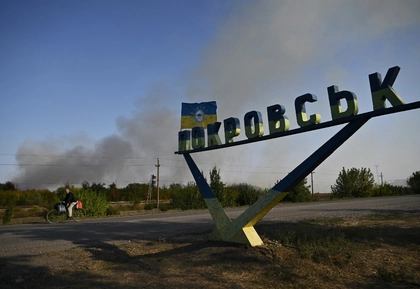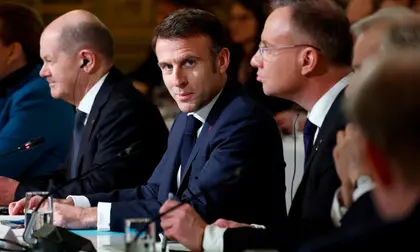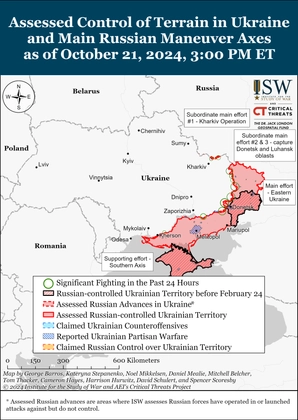The controversy over statements made by French President Emmanuel Macron last week continues. At a press conference after a Paris meeting of EU leaders aimed at boosting European support for Ukraine he had said that while there was no consensus about sending troops to Ukraine, given the dynamic unfolding, nothing could be ruled out. EU leaders were quick to reject the idea.
Europe getting nervous
JOIN US ON TELEGRAM
Follow our coverage of the war on the @Kyivpost_official.
El Periódico de Catalunya examines Macron's possible motives:
“Perhaps France, the only nuclear power in the EU, wants to be on the front page of the newspapers again. ... Or it could have been a message from the EU to Putin. ... A third possibility would be that he wanted to confuse Marine Le Pen and her Rassemblement National, who sympathise with Putin. ... Europe's nervousness is behind these declarations: if Trump returns, we will be defenceless.”
A lot of talk but few facts
Macron's move exposes Europe's lack of commitment, Corriere della Sera concludes:
“The outraged reactions of the other Europeans speak volumes about the unwillingness of public opinion (and consequently of governments) to recognise the seriousness of the situation. The war is going badly for the Ukrainians, the pro-Trump Republicans are blocking aid for Kyiv in Congress, yet the Europeans are not even willing to risk transferring the Russian frozen reserves in Europe to Ukraine as quickly as possible. ... Nor are things any better on the defence side. A lot of talk but few facts. 'Facts' in this sense means getting the Europeans to accept a shift of resources in favour of defence. This is politically impossible if public opinion is not properly prepared for such a step.”

Frontline Ukraine Cafe Offers Glimpse of Normality as War Rages
What we need now are weapons
Political scientist Oleksandr Chebanenko recommends focusing on more urgent problems:
“I suggest leaving decisions about Western troops being deployed in the war in Ukraine (not about the individual volunteers who are bravely fighting side by side with the Ukrainians) to the conscience of politicians. What we definitely need from the West, however, are modern weapons, ammunition, equipment and technologies. Not as aid, but as an investment in its own security. And urgently. Because the inhumane racists will not wait. ... How much is Western civilisation worth?”
Rearmament won't bring peace
Eldiario.es takes the opportunity to make a general plea against armament:
“The defence industry is Europe's second-fastest growing sector behind the artificial intelligence industry. ... The opinion that increased military spending will prevent a war in Europe is unfounded. ... Europe has more military capacities than Russia but that didn't prevent the invasion of Ukraine. The military path has proven ineffective for achieving peace in Europe. Instead of talking about rearming, Europe should be talking about a ceasefire, negotiations, a peace agreement and a disarmament and demilitarisation plan to create peace for the future of the Old Continent.”
Very real dangers
Hvg is concerned about the growing risk of a direct confrontation between Nato and Moscow:
“Although Macron emphasised that he was not speaking on behalf of Nato, just the fact that the possibility of sending Western troops into Ukraine, which of course is only possible through a Nato member state, was even mentioned, has created a new situation. And if a member of the alliance ends up in conflict with Russia, the danger of a direct confrontation between Nato and Moscow could become even greater, and bring Article 5 into consideration. For example, if Russia were to attack the country that sent troops to Ukraine.”
A counterweight to Russia's Baltic threat
In a Facebook post, journalist Anatoly Nesmiyan sees a strategy behind Macron's statements:
“Given the possibility of certain developments in the Baltic region, his approach is logical - the idea is to create a threat elsewhere, especially considering that it is almost impossible to defend the Baltic states: the area is too small. Partisans may be able to operate there, but defence is complicated. In short, everyone is in the picture, everyone is preparing for the scenario outlined by Trump. ... Anyone who claims Russia doesn't have the means to invade the Baltic states is in denial. It may not have the resources for a protracted conflict, but it has enough for a blitzkrieg.”
Other forces at work here
It was Robert Fico, not Emmanuel Macron, who started the discussion about sending ground troops to Ukraine, points out Jutarnji list:
“A reporter asked [Macron] for a comment on a statement made by Slovak Prime Minister Robert Fico before the meeting (!) according to which sending EU and Nato troops to Ukraine was under discussion. But instead of everyone focusing on Fico and his obvious attempt to sabotage the meeting and its decisions, it's Macron who is under fire. Fico is the culprit but gets off scot-free. ... His action has worked in Russia's favour, which has been given an opportunity to demonstrate its resolve.”
Another European quantum leap needed
Europe needs to make another quantum leap in this area, urges Le Soir:
“It's time to show Putin that the West will do whatever it takes to put him in check mate, for the security of Ukraine and for Europe as a whole. ... Over the last two years, Europe has taken big steps that had seemed impossible before, but as observers acknowledge with concern: Europe has a long way to go before it can speak and act from a united standpoint, although the state of the world demands this louder with every passing day. A few months ago, 'Brussels' launched the Green Deal to save the planet, then it brought out its 'energy' programmes to save purchasing power. Today it's time to save peace by preparing for the eventuality of war.”
New scenarios for Putin
Paris is getting serious, applauds Rzeczpospolita:
“It could send training troops to Ukraine or organise facilities for repairing Ukrainian military equipment. France's resolve is apparent in its decision to send long-range missiles, which is still a no-no for Germany. And also in its involvement in a Czech initiative to buy munition for Kyiv outside Europe. Sending in Nato troops remains a last resort. But it is one that Putin can no longer rule out.”
War on Ukrainian soil preferable
For political scientist Volodymyr Horbach commenting in Unian, the deployment of EU ground troops in Ukraine could very well become reality:
“We can see that EU countries have come round to the idea that this is not some local war, but a war with global consequences. ... The concern, worry and fear about a Russian attack could lead to such a decision being taken in the future. Because if a clash with Russia were to become inevitable, it would be preferable to fight on Ukrainian territory rather than on EU or Nato territory. This means that it would be a rational step - a forward-looking step.”
It's not about front-line fighters
La Repubblica interjects:
“If Kyiv is to withstand the superiority of the Russian war machine, the only solution is to beat quantity with quality and equip it with technologically advanced weapons. But it will take many months for the Ukrainians to learn to use these tools. Too late to overcome the crisis. ... The only way to immediately put the armed forces in a position to deploy long-range missiles, fighter planes, helicopters, radar, air defence systems and electronic jamming equipment is to send Western soldiers. Not front-line fighters, but technicians, and officers who can devise tactics to maximise the potential of the weapons while remaining in the background.”
Focus on diplomatic role
Commenting in Le Figaro, lawyer and former conservative member of parliament Pierre Lellouche wishes France would adopt a stronger role as moderator:
“Macron's escalation feels as improvised as it is dangerous. Of course it is legitimate to offer financial and military assistance to a neighbouring democratic state that is under attack. But sending in ground troops is tantamount to engaging in open warfare with a major nuclear power. Is France ready for this? Should the nation which likes to present itself as a 'regulating power' (another Macron term) not have tried to come up with a diplomatic solution, as indeed the warring parties themselves were attempting to do in Istanbul a year ago? In any case, there needs to be a debate about this, above all in the National Assembly.”
No financial basis for this initiative
Macron's words were rash, writes political analyst Cristian Unteanu in Adevărul:
“Normally, such an option would constitute a shift in Nato's classic strategic stance, and that is not something that is decided at a conference in Paris. It would be decided at the level of heads of state and government, and obviously only after a change in NATO leadership and once the results of the election battle in the US are known. Moreover, such a discussion has no credible financial basis given the current economic situation in Europe. So far Ukraine has yet to receive even 30 percent of the artillery shells promised with such pathos by Western leaders.”
Paris wants to up the pressure on Berlin
Germany is not pulling its weight, Kauppalehti states:
“In the EU it's the normal pattern that France comes up with big ideas and Germany reacts hesitantly. Then they plot out a joint course. ... Macron wants to turn up the heat on Germany because Scholz is still refusing to send its powerful Taurus cruise missiles to Ukraine. ... Experts are saying that Macron's initiatives are getting increasingly belligerent. After the meeting, Macron announced: "We will do whatever it takes to stop Russia winning the war." The question is whether Germany is also doing its bit.”
Deplorable European cacaphony
Zeit Online agrees with critics of the idea:
“Macron-bashing is perfectly justified this time. Because there was no need to continue the spiral of escalation. But that's just one part of it. Because this magnificent, sabre-rattling, gung-ho Frenchman stands opposite the German accountant-chancellor, who is stubbornly refusing to deliver Taurus missiles to Ukraine. On one side glamorous Frenchman, on the other the grey German. Neither is helping Ukraine. This European cacophony is utterly deplorable – at a time when Europe should be standing united and resolute against Russian imperialism.”
You can also highlight the text and press Ctrl + Enter






